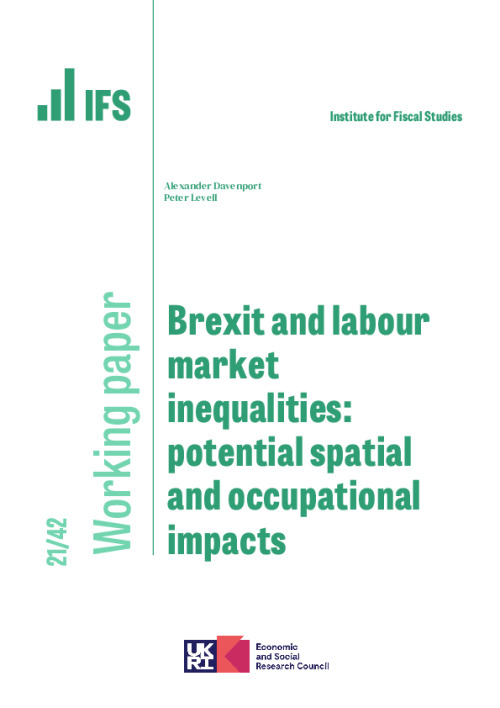Downloads
In this paper we examine the possible distributional impacts of new trade barriers associated with the new Trade and Cooperation Agreement governing relations between the UK and EU after Brexit. We use a model of labour demand that incorporates input-output links across industries, and that allows for demand substitution by firms and consumers and worker reallocation across industries. We find that workers’ exposure is moderately increasing across the earnings distribution. Exposure is greater for men than for women as they are more likely to work in manufacturing industries that are relatively harder hit by new trade barriers. Looking across areas, we find that exposure to new Brexit trade barriers is uncorrelated with measures of local deprivation and the impacts of the recent COVID-19 pandemic.
Authors

Associate Director
Peter joined in 2009. He has published several papers on the microeconomics of household spending and labour supply decisions over the life-cycle.

Alex Davenport
Working Paper details
- DOI
- 10.1920/wp.ifs.2021.4221
- Publisher
- Institute for Fiscal Studies
Suggested citation
Davenport, A and Levell, P. (2021). Brexit and labour market inequalities: potential spatial and occupational impacts. London: Institute for Fiscal Studies. Available at: https://ifs.org.uk/publications/brexit-and-labour-market-inequalities-potential-spatial-and-occupational-impacts (accessed: 30 June 2024).
Grant
Related documents
Download appendix
PDF | 482.38 KB
More from IFS
Understand this issue

If you can’t see it, you can’t be it: role models influence female junior doctors’ choice of medical specialty
24 April 2024

Retirement is not always a choice that workers can afford to make
6 November 2023

IFS contributor Claudia Goldin wins Nobel Prize in economics
9 October 2023
Policy analysis

How do the last five years measure up on levelling up?
19 June 2024

Universal credit: incomes, incentives and the remaining roll-out
11 June 2024

The Conservatives and the Economy, 2010–24
3 June 2024
Academic research

The impact of labour demand shocks when occupational labour supplies are heterogeneous
28 June 2024

Imagine your life at 25: Gender conformity and later-life outcomes
24 April 2024

Inequality in Denmark, 1987–2021
28 June 2024
